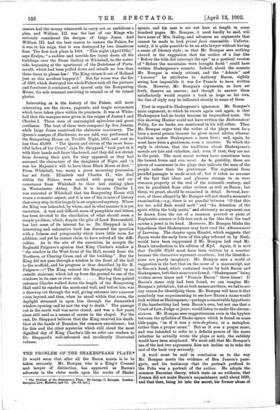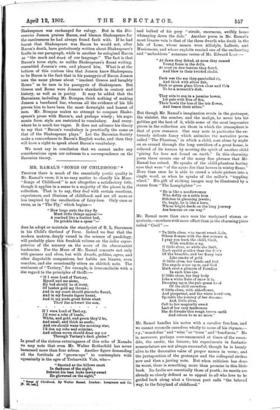THE PROBLEM OF THE SHAKESPEARE PLAYS.*
IT would seem that after all the Bacon mania is to be taken seriously. Mr. Bompas, who is a King's Counsel and lawyer of distinction, has appeared as Bacon's advocate in the claim made upon the works of Shake- • The Problem of the Shakespeare Plays. B George C. Bompar. London Sampson Low, Manton, and Co. [ge. ed. net.]
speare, and his case is set out here at length in some hundred pages. Mr. Bompas, it need hardly be said, will have none of Mrs. Gallup, and advances no arguments that cannot be made to look prima facie reasonable. Unfortu- nately, it is quite possible to be an able lawyer without having a sense of literary style ; so that Mr. Bompas sees nothing absurd in the suggestion that the author of a line like " Before the hills did intercept the eye " as a poetical version of " Before the mountains were brought forth " could have written Shakespeare's sonnets. Indeed, about the sonnets Mr. Bompas is wisely reticent, and the " Adonis " and " Lucrece" he attributes to Anthony Bacon, rightly seeing how impossible it was for Francis to have written them. However, Mr. Bompas's arguments, as here set forth, deserve an answer; and though to answer them satisfactorily would require a book as large as his own, the line of reply may be indicated shortly to some of them.
First in regard to Shakespeare's ignorance. Mr. Bompas's main argument, to which he recurs again and again, is that Shakespeare had no books because he bequeathed none. On this showing Hooker could not have written the Ecclesiastical Polity, for no books are mentioned in his will either. Then Mr. Bompas urges that the writer of the plays must have been a moral person because he gives moral advice, whereas tradition makes Shakespeare a loose liver ; and, again, he must have been a gentleman, even a courtier. To which the reply is obvious, that the traditions about Shakespeare's morals are late and valueless, and, even if true, they are not to the point. The most moral writers have sometimes been the loosest livers and vice versa. As to gentility, there are pieces of coarseness in the plays that indicate the man of the people rather than the gentleman. The argument from parallel passages is made much of ; but it takes no account of the fact that ideas and phrases strange to us were common property at the end of the sixteenth century, and can be paralleled from other writers as well as Bacon ; but these, we grant, should be examined in detail. Several, how- ever, of those alleged by Mr. Bompas will not stand a moment's examination,—e.g., there is no parallel between " 0 that this too too solid flesh would melt " and " the detention of the spirit within the body melts," and obviously no argument can be drawn from the use of a common proverb or piece of Euphuistic science or folk-lore such as the idea that the toad carries a jewel in its head. Moreover, Mr. Bompas blinks the hypothesis that Shakespeare may have read the Advancement of Learning. The chapter upon Hamlet, which suggests that Bacon wrote the early form of this play referred to by Nash, would have been suppressed if Mr. Bompas had read Mr. Boas's introduction to his edition of Kyd. Again, it is said that Twelfth Night must have been written by a courtier because the characters represent courtiers ; but the identifica- tions are purely imaginary. Mr. Bompas sees a world of suggestion in the fact that on the cover of a manuscript, not in Bacon's hand, which contained works by both Bacon and Shakespeare, both their names are found; "Shakespeare" being written seven times and " Francis Bacon " three times ! If Bacon's name only had been found, we can imagine Mr. Bompas's jubilation ; but as both names are there, we fail to see any reason for identifying them. Mr. Bompas will have it that somebody was experimenting to see how Bacon's name would look written as Shakespeare,—perhaps a conceivable hypothesis if the handwriting had been Bacon's own, but not one that a Court of Law, Judge or juror, would listen to under the circum- stances. Mr. Bompas sees suggestiveness even in the hyphen between the syllables of Sbake-speare which is found on some title-pages, " as if it was a nom-de-plume, or a metaphor, rather than a proper name." But as it was a proper name, and was intended to refer to a definite person of the name (whether he actually wrote the plays or not), the subtlety would have been misplaced. We must add that Mr. Bompas's use of the last two arguments does not incline us to take the rest of the book very seriously.
A word must be said in conclusion as to the way Mr. Bompas meets the evidence of Ben Jonson's pane- gyric, and his testimony that the portrait prefixed to the Folio was a portrait of the author. He adopts the common Baconian theory, which rests on no evidence, that Jonson did not make Bacon's acquaintance until about 1620, and that then, being let into the secret, his former abuse of
Shakespeare was exchanged for eulogy. But in the Dis- coveries Jonson praises Bacon, and blames Shakespeare for the carelessness he had always found fault with. If he had learnt that Shakespeare was Bacon he would not, after Bacon's death, have gratuitously written about Shakespeare's faults in one paragraph, while in another he eulogised Bacon as " the mark and giz cti of our language." The fact is that Bacon's terse style, so unlike Shakespeare's fluent writing, resembled Jonson's own, and pleased him. What is at the bottom of this curious idea that Jonson knew Shakespeare to be Bacon is the fact that in his panegyric of Bacon Jonson uses the same phrase about " insolent Greece and haughty Rome" as he uses in his panegyric of Shakespeare. But Greece and Rome were Jonson's standards in oratory and history, as well as in poetry. It may be added that the Baconians, including Mr. Bompas, think nothing of making Jonson a barefaced liar, whereas all the evidence of his life proves him to have been the most downright and honest of men. Mr. Bompas makes no attempt to compare Shake- speare's prose with Bacon's, and perhaps wisely ; his argu- ments from style are restricted to vocabulary. And every- where he is much too vague. It does not advance his theory to say that " Bacon's vocabulary is practically the same as that of the Shakespeare plays." Let the Baconian Society make a concordance to Bacon's English works, and then they will have a right to speak about Bacon's vocabulary.
We must say in conclusion that we cannot under any considerations open our columns to a correspondence on the Baconian theory.











































 Previous page
Previous page